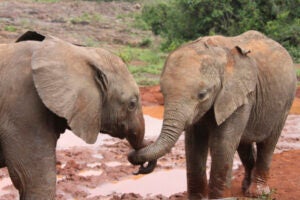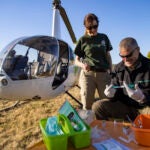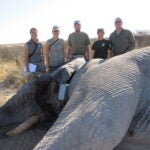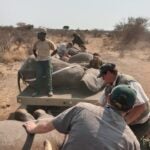
CAPE TOWN, South Africa— Animal protection organisation Humane Society International/Africa has advanced a unique community-based conservation project around Ithala Game Reserve to facilitate peaceful co-existence between elephant herds and local people. In collaboration with Ezemvelo KZN Wildlife, African Conservation Trust and the Bio-Diversity Conservation Foundation, HSI/Africa is constructing an elephant-proof fence in the 290 km2 reserve in northern KwaZulu-Natal province to stop resident pachyderms from leaving the prescribed area and damaging local crops as they roam further afield. Project Elefence clearly aligns with the South African Government’s White Paper on Conservation and Sustainable Use of South Africa’s Biodiversity, approved and gazetted earlier this month, which aims to “conserve and manage South Africa’s biodiversity, and ensure healthy ecosystems, ecological integrity and connectivity, with transformative socio-economic benefits to society for current and future generations.”
The fence will provide a humane solution to mitigate elephant-human conflict instead of lethal population control methods such as culling. The project’s collaborative, community-centric approach is the result of many years’ work by HSI/Africa and partners which has placed establishing relationships with local communities and employing social ecologists right at the heart of the project. As the boundary between several communities and the reserve is currently unfenced, the project brings enormous benefits and security to the people living close by, while also protecting the resident wildlife. Project Elefence runs alongside HSI/Africa’s other humane elephant management project at Ithala, an innovative immunocontraception program implemented since 2014.
An additional benefit is that the fence still allows smaller animals including local cattle herds to walk under the fence to access their grazing areas and the Phongolo river, while keeping elephants in the confined area.
Audrey Delsink, elephant biologist and HSI/Africa director of wildlife, says: “This is a prime example of human-wildlife cooperation that is implicit within the government’s White Paper, because it creates wildlife and community benefit at the same time. It was absolutely imperative for us from the outset to adopt a community-centered approach. We have eight communities including the land-owning communities of Ithala fully engaged in this project as active stakeholders and participants. Far too often, conservation projects have taken a top-down approach and failed to engage the local communities that are directly affected. With Project Elefence, the surrounding communities are essential partners who have a clear vested interest in making this work to protect and enhance their land tenure, livelihoods, crops and property. As an elephant biologist, I’m also proud that HSI/Africa is yet again spearheading practical, humane solutions to prevent lethal killing being used to control elephants in South Africa.”
HSI/Africa applauds the project partners for their involvement in this cutting-edge initiative, the first of many projects supporting the mission set forth in the White Paper and urges the adoption of this community-based conservation method throughout the rest of South Africa.
ENDS
Media contact: Leozette Roode, media specialist for Humane Society International/Africa, LRoode@hsi.org, +27 71 360 1104.



